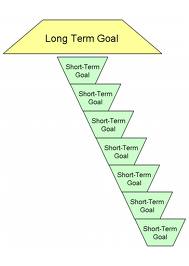Sports Coaching - Goal Setting


Goal Setting
“A goal is generally defined as the aim or object of something we are trying to obtain” – (Locke & Latham, 1985).
So goal setting is the proccess of setting out and defining what you want to achieve or obtain. A sports coach is likely to be interested in setting short term, proccess goals for the athletes initially, this is likely to be focused upon increasing the success rate of the execution of a certain skill or technique that is particularly relevant to an athletes sport and their role within the team. The coach is likely to give the players training drills which focuses on these key skills and encourages the development of them, first stage will be identifying the current level of ability of the group of players a coach has and the particular strengths and weaknesses of each individual player, once this is established goal setting can take place.
Each coach has their own approach, one particular variation is the difficulty of the goals that they set their players, although a difficult goal is good because it sets a high standard and shows a high level of ambition, there is a school of thought that it may also become demotivating if the player fails to get the fulfillment from achieving his targets. Researchers “Locke and Latham” say that the goal should be so difficult that only 10% of the individuals it concerns can fulfil it, However Kylo and Landers (1995) did a study which found moderate goals to be more effective. Personally I agree with the latter, If the athlete acknowledges that the goal is too difficult they might feel its not worth pursuing. Once again I feel that the benefit of the individual gaining gratification from fulfilling a goal, outweighs that of setting a difficult one. However there are counter arguments, that some of the greatest sporting achievements have been obtained by individuals having goals which aim to be the very best in the history of their discipline, People felt that humans would never break the four minute mile barrier, as though they believed it to be a biological incapability, so it’d be fair to say that when Roger Bannister declared that he would one day run the mile in under four minutes he was setting himself a goal of high difficulty.
Once a coach has gaged the skill of his players and set them goals of whatever difficulty they see fit, for instance A player who manages 50% success rate for his passing during training, may set the goal to achieve a 60% pass rate, which would be a good gentle progression, however the coach may wish to set an ambitious goal of achieving 100% success rate for passes, this is also arguably unrealistic and goes against the S.M.A.R.T principles of training; (s)pecific (m)easureable (a) chievable (r)ealistic (t) ime based.
Aside from setting players their individual process goals, the coach will want to set a goal for the team as a whole, this is commonly a outcome goal which is a goal that is focused purely on the outcome of the game, however some coaches such as Arsenal’s (Football club) head coach Arsene Wenger are more likely to set performance goals, concerned more with the nature in which they win or play rather than simply outright only caring about the result, it is the failure to fulfil performance goals set by the coach which leads some coaches to critisize their players even after winning a match.
Coaches will set goals of different lengths, they may set them the end goal which is long in length, for instance the aforementioned player may be encouraged to improve so he has a 100% pass success rate, however coaches are advised that in order to get the best out of their atheltes and for goal setting to be effective they should not only set an end goal of long term length which gives the player/s direction and something to aim for but intersperse current ability and end target with several other smaller targets, which increase in equal increments allowing the athlete to better envisage the proccess they are undertaking and gives them the fulfillment of reaching as many small goals as possible before reaching their end goal.
“A multiple goal strategy will yield the best performance and psychological results” - (Sports Psychology, concepts and applications 5th ed, Richard Hill, 2002)
Coaches will continually evaluate progress and adapt goals where they see fit.
Completion of a Process Goal increases the likelihood of completing a Performance goal which in turn will increase the odds of winning competitions and fulfilling your outcome goal. Subsequently failure to fulfil an outcome goal can be traced back to failure of a performance goal and can be down to an individuals failure to achieve their process goal. (Think of a player who misses a sitter which changes the complexion of the game), therefore i would focus mainly on setting proccess goals and focus on improving the individuals skills to better enable them to fulfil performance goals within a team and ultimately achieve outcome goals via victory.







